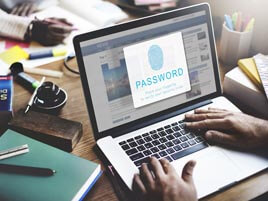Brought to you by Primus - a smart choice for your Internet and Home Phone services.

When it comes to online security, bad habits can have serious consequences. If we had to draw an analogy with real-world bad habits, we’d say they’re less like nail biting and more like forgetting to lock the door. Both take a little work to beat, but the second can have more serious consequences. Indulging in bad online security habits can lead to a compromised bank account, identity theft, or worse—so it’s worth taking a little personal inventory.
Using the Same Password for Every Account
The bad habit: You have approximately thirty-six accounts and they all need passwords, and one is easier to remember than thirty-six, right?
The problem: If just one of those services does something foolish and exposes your password to hackers, all of your accounts are compromised.
The solution: All of your major accounts (email, bank, online shopping, etc.) deserve unique passwords. If necessary, you can use a password manager to keep it all straight.
Ignoring Updates and Patches
The bad habit: You get an update notification, but you’d rather ignore it and keep looking through your friends wedding pictures on Facebook—you’ll get it eventually.
The problem: About half of all software vulnerabilities exploited last year were exploited in the first week of being announced; by putting updates off, you’re exposed to attack.
The solution: If you won’t update immediately, at least set your computer to update when you get up to leave it. Alternatively, do the update when you’re first prompted and take advantage of a break.
Abusing Public WiFi
The bad habit: You’re in Starbucks and it occurs to you that you’ve forgotten to order something off of Amazon, so you whip out your credit card . . .
The problem: You have no idea how secure that public WiFi is and you don’t know who might have access to it, and by extension, your sensitive information.
The solution: If you’re using public WiFi, don’t log into any thing you want exposed to hackers. Consider using a VPN (virtual private network) or your phone’s hot spot.
Avoiding Anti-Virus Software
The bad habit: Your anti-virus software is a pain-in-the-you-know-what, so you’ve turned it off.
The problem: Anti-virus software is your last line of defence, and it’s usually cheaper than a broken computer. And don’t think that your Mac is immune to viruses. That’s a misconception.
The solution: Get good anti-virus software and use it. Believe it or not, there are some good free options out there.
Carelessly Clicking Links and Attachments
The bad habit: You answer a dozen or so emails a day, so the faster you open them, the faster you can respond.
The problem: Hackers are getting very good at creating emails that look legitimate. They will make emails that look like they come from your bank, complete with a spoofed address that looks very legitimate, or send you to a site that looks identical to the real thing.
The solution: Be sceptical of everything. Anytime you’re prompted for sensitive information, like account numbers, usernames, and passwords, double check everything to make sure it’s legitimate. Look twice at the URL, the email address, and the destination of any links.
The Bottom Line
Good security starts at home. The best defence against hackers is a little bit of prevention and a healthy dose of scepticism.






